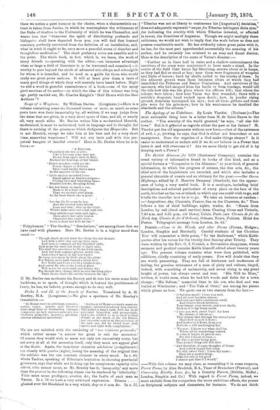Books I. and II. of the .A muds of 'radius.
Translated by A. H.
Beesley, MA. (Longmans.)—We give a specimen of Mr. Beesley's translation
"At Bonne more in servitium,consules, "And now all Rome—conauls, senators, puttee, eques. Queue° quis illustrior knights—plunged headlong into slavery. tanto ntagi falsi ac festinantes, vultuque The higher a man's rank, with the more iczoimerottoivniemloaictiloe.xleaecsrsinussr.ingiluninen profound hypocrisy, and promptitude, and looks studied so as to show neither
questus adulatioui miscobant." delight at the death of the old Prince. nor excessive sorrow at the accession of the new one, did he blend tears with smiles and sighs with compliments."
We are not satisfied with the rendering of "neu tristiores primordio," which rather means a sorrow too great to suit the accession.' Of course they would wish to seem not only not excessively sorry, but not sorry at all at the accession itself, only they must not appear glad at the death. Again, the translator connects adulationi (compliments) too closely with guestus (sighs), losing the meaning of the original that the adulatio was the one constant element in every mood. In c. 80, where Tacitus, speaking of Tiberius's hesitation in choosing provincial governors, says that while not looking out for conspicuous capacity vitia oderat, vitia cannot mean, as Mr. Beesley has it, incapacity,' any more than the pessimi in the following clause ean be rendered by 'inferiority.' Vitia must mean profligacy, avarice, &c., the faults of such men as Verres. In c. 76 we have a very awkward expression. Drusns . . . gloated over the bloodshed in a way which, deep as it was, &c. In c. 77, "Tiberius was not at liberty to contravene his [Augustus's] decisions,' does not adequately represent "nequefas Tiberius infringere dicta °jail," fas indicating the sanctity with which Tiberias invested, or affected to invest, the directions of Augustus. Though we might multiply these criticisms, we would not wish to imply that the work before us does not possess considerable merit. He has evidently taken great pains with it, he has, for the most part apprehended successfully the meaning of his author, and he certainly has attained to an easy and fluent diction. Here is the description of the scene of Varua's disaster :- "Further on in lines half in ruins and a shallow entrenchment the survivors of the army were conjectured to have made a stand. In the centre of the field their bones lay blanching, strewn about or in heaps, as they had fled or stood at bay; near them were fragments of weapons and limbs of horses ; hard by skulls nailed to the trunks of trees. In the adjacent groves were those inhuman altars at which they had immolated the Tribunes and Senior Centurions. And survivors of the massacre, who had escaped from the battle or from bondage, would tell the tale how this was the place where the officers fell ; that where the colours were taken' how here Yarns was first wounded; there with a suicide's desperate hand rushed upon death • how, in yonder rising ground, Arminius harangued his men; how all these gibbets and these pits were for his prisoners ; how in his wantonness he insulted the standards and the colours."


































 Previous page
Previous page